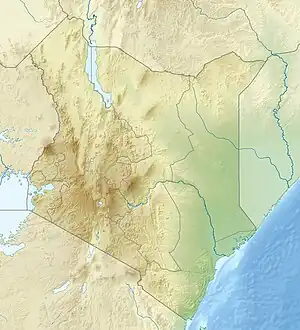| Sondu Miriu Hydroelectric Power Station | |
|---|---|
 Location of Sondu Miriu Hydroelectric Power Station in Kenya | |
| Country | Kenya |
| Coordinates | 0°20′33″S 34°51′08″E / 0.34250°S 34.85222°E |
| Purpose | Power |
| Status | Operational |
| Construction began | 1999[1] |
| Opening date | 2007[2] |
| Owner(s) | Kenya Electricity Generating Company |
| Dam and spillways | |
| Impounds | Sondu River |
| Sondu Miriu Hydroelectric Power Station | |
| Operator(s) | Kenya Electricity Generating Company |
| Commission date | 24 July 2009[3] |
| Type | Run-of-the-river |
| Turbines | 2 X 30MW |
| Installed capacity | 60 MW (80,000 hp) |
The Sondu Miriu Hydroelectric Power Station is a hydroelectric power station on the Sondu River in Kenya.[4][5]
Location
The power station is located near the village of Kusa in Kisumu County, approximately 55 kilometres (34 mi), by road, southeast of Kisumu, the location of the county headquarters.[6] This lies approximately 350 kilometres (217 mi), by road, northwest of Nairobi, the capital and largest city in the country.[7] The coordinates of the power station are:0°20'33.0"S, 34°51'08.0"E (Latitude:0°20'33.0"S; Longitude:34°51'08.0"E).[8]
Overview
The power station is unique because it is not located directly on the river from which it derives the water that powers it. At the intake point, water is diverted to the power station, via a 6.2 kilometres (3.9 mi) intake tunnel. After the power is generated, the water effluent is discarded about 13 kilometres (8 mi) downstream of the intake point via an outlet channel that measures 4.7 kilometres (3 mi). A 50 kilometres (31 mi) 135kV transmission line carries the power from the power station to a substation in Kisumu, where it is integrated into the national electricity grid. Construction lasted 10 years, with a loan from the Japan Bank for International Cooperation at a total cost of Sh19 billion (US$249 million).[1][9]
Other considerations
After Sondu Miriu was built, another associated power station, the 20.2 MW (27,100 hp) Sang'oro Hydroelectric Power Station, was built between 2007 and 2013, using the water discharge from Sondu Miriu as its intake.[10][11][12]
Ownership
Sondu Miriu Hydroelectric Power Station is 100 percent owned by Kenya Electricity Generating Company, a parastatal company of the government of Kenya.[5]
See also
References
- 1 2 Sambu, Zeddy (28 July 2009). "Proposed project on Sondu Miriu River to ease power shortages". Business Daily Africa. Nairobi. Retrieved 5 April 2016.
- ↑ KNI (9 May 2013). "Kisumu's Sh5.6 Billion Power Project Ready". Kisumu: Kisumu News Info (KNI). Retrieved 5 April 2016.
- ↑ Capital FM Reporter (24 July 2009). "Kenya launches Sondu Miriu power plant". Nairobi: 98.4 Capital FM. Retrieved 5 April 2016.
- ↑ Africa Water Network (22 December 1999). "The Impacts of Sondu-Miriu River Hydro-Electric Power Project on the People of Nyanza". Internationalrivers.org. Retrieved 5 April 2016.
- 1 2 KENGEN (5 April 2015). "Kenya Electricity Generating Company: Sondu Miriu Hydroelectric Power Project". Nairobi: Kenya Electricity Generating Company (KENGEN). Retrieved 5 April 2015.
- ↑ GFC (5 April 2016). "Distance between Kusa, Kisumu, Kenya and Kisumu, Kenya". Globefeed.com (GFC). Retrieved 5 April 2016.
- ↑ GFC (5 April 2016). "Distance between Nairobi, Kenya and Kusa, Kisumu, Kenya". Globefeed.com (GFC). Retrieved 5 April 2016.
- ↑ Google (5 April 2016). "Location of Sondu Miriu Hydroelectric Power Station" (Map). Google Maps. Google. Retrieved 5 April 2016.
- ↑ DCIL (5 April 2016). "Durant & Company International Limited: Sondu/Miriu Hydropower Project, Nyanza Province, Kenya". Durant & Company International Limited (DCIL). Retrieved 5 April 2016.
- ↑ Cherono, Stella (27 July 2011). "Sondu Miriu power plant boost for jobs and schools". Daily Nation. Nairobi. Retrieved 5 April 2016.
- ↑ Sunday, Frankline (11 August 2011). "Sondu Miriu power project to ease energy crisis in western Kenya". Business Daily Africa. Nairobi. Retrieved 5 April 2016.
- ↑ JICA (23 January 2007). "Sondu-Miriu Hydropower Project Sang'oro Power Plant: Ex-Ante Evaluation" (PDF). Tokyo: Japan International Cooperation Agency (JICA). Retrieved 5 April 2016.